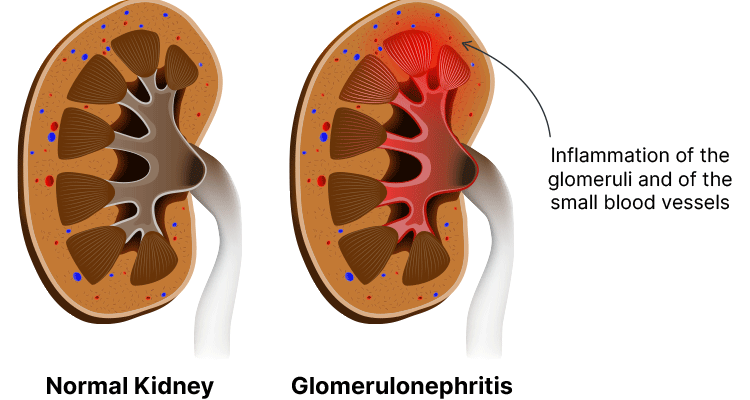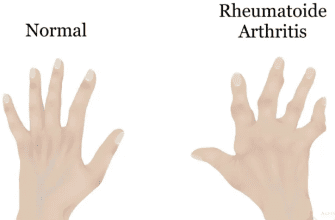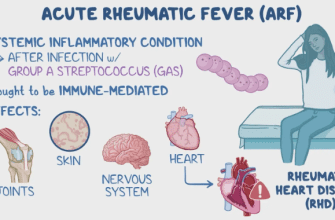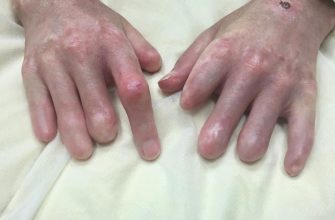Glomerulonephritis is a condition characterized by inflammation of the glomeruli, the small filtering units in the kidneys. This inflammation can lead to impaired kidney function and is associated with various underlying causes and complications.
Etiology and Causes
- Primary Glomerulonephritis: Conditions that originate in the kidneys, such as:
- Minimal Change Disease: Common in children.
- Focal Segmental Glomerulosclerosis (FSGS): Can occur in adults.
- Membranous Nephropathy: Often develops in adults.
- Secondary Glomerulonephritis: Results from systemic diseases or infections that affect the kidneys, including:
- Infections: Such as post-streptococcal glomerulonephritis following streptococcal throat infections or infections like HIV and hepatitis.
- Autoimmune diseases: Such as lupus erythematosus or vasculitis.
- Diabetes: Diabetic nephropathy is a common complication.
- Hypertension: Chronic high blood pressure can cause kidney damage.
Risks
- Family history of kidney disease.
- Autoimmune disorders.
- Infections, particularly significant bacterial or viral infections.
- Certain medications (like non-steroidal anti-inflammatory drugs (NSAIDs) or certain antibiotics).
- Diabetes and hypertension.
Symptoms
- Hematuria (blood in urine), often giving it a tea-colored appearance.
- Proteinuria (excess protein in urine), leading to frothy urine.
- Edema (swelling) in the face, hands, feet, or abdomen due to fluid retention.
- Hypertension (high blood pressure).
- Decreased urine output.
- Fatigue.
- In severe cases, signs of kidney failure may develop, including weakness, paleness, and nausea.
Diagnosis
- Medical history and physical examination: To assess symptoms and risk factors.
- Urinalysis: To detect hematuria, proteinuria, and other abnormalities.
- Blood tests: To evaluate kidney function (serum creatinine, blood urea nitrogen) and check for markers of autoimmune diseases (such as antinuclear antibody (ANA) or anti-double-stranded DNA).
- Imaging studies: Such as ultrasounds to assess kidney structure.
- Kidney biopsy: In some cases, a small sample of kidney tissue may be taken to determine the specific type of glomerulonephritis.
Treatment
- Medications:
- Corticosteroids to reduce inflammation.
- Immunosuppressants for autoimmune causes.
- Antihypertensive agents (like ACE inhibitors) to control blood pressure.
- Diuretics for edema.
- Dietary changes: Low sodium and protein intake may be recommended.
- Dialysis: Required in severe cases when kidney function is significantly impaired.
- Kidney transplant: An option for advanced kidney failure.
Prevention
- Manage chronic conditions: Such as diabetes and hypertension through diet, exercise, and medications.
- Prompt treatment: For infections, especially streptococcal infections.
- Avoid nephrotoxins: Such as certain drugs and excessive use of NSAIDs.
Complications
If left untreated, glomerulonephritis can lead to various complications, such as:
- Chronic kidney disease (CKD): Leading to kidney failure.
- Nephrotic syndrome: A group of symptoms indicating kidney damage.
- Increased risk of cardiovascular disease: Due to hypertension and other factors.
- Acute kidney injury (AKI): This can lead to sudden loss of kidney function.







